
ผู้แนะนำโบรกเกอร์ (IB) เทียบกับ Affiliate: มีความแตกต่างกันอย่างไร?
เนื้อหา
อุตสาหกรรมแลกเปลี่ยนเงินตราต่างประเทศและ iGaming พึ่งพาตัวกลางอย่างมากในการดึงดูดลูกค้าใหม่ มีสองประเภทหลักๆ คือ โบรกเกอร์แนะนำ (Introducing Broker) และพันธมิตร (Affiliate) ซึ่งมีบทบาทสำคัญในการพัฒนาธุรกิจและการหาเทรดเดอร์ แม้ว่าทั้งสองประเภทจะพยายามส่งเสริมโบรกเกอร์ แต่ก็มีความแตกต่างที่สำคัญในด้านหน้าที่ กฎระเบียบ และการสร้างรายได้จากโบรกเกอร์
แม้ว่าทั้ง IB และ Affiliate จะมีบทบาทในการขายและพัฒนาธุรกิจ แต่ก็มีความแตกต่างอย่างเห็นได้ชัดในด้านการจำแนกประเภทตามกฎระเบียบ ความสัมพันธ์กับโบรกเกอร์ งานที่จำเป็น และรูปแบบรายได้ ในบทความนี้ เราจะพิจารณาความแตกต่างเหล่านี้อย่างละเอียด นอกจากนี้ เราจะสรุปการทำงานทั่วไปของแต่ละบทบาทในการส่งเสริมการขายในตลาดแลกเปลี่ยนเงินตราต่างประเทศและไบนารีออปชัน
คำจำกัดความ
โบรกเกอร์แนะนำ (IB) — โดยทั่วไปคือบุคคลหรือบริษัทที่ได้รับใบอนุญาตซึ่งทำสัญญากับโบรกเกอร์ชั้นนำ หรือที่รู้จักกันในชื่อ Foreign Exchange Dealer (FXD) IB มีหน้าที่รับผิดชอบในการจัดหาบัญชีลูกค้าใหม่และดูแลรับผิดชอบหลักๆ เช่น การตรวจสอบการเริ่มใช้งานและการปฏิบัติตามข้อกำหนด ในทางกลับกัน พวกเขาจะได้รับส่วนแบ่งค่าคอมมิชชั่นและค่าธรรมเนียมการซื้อขายทั้งหมดตามเปอร์เซ็นต์ที่ตกลงไว้ล่วงหน้าจากฐานบัญชีที่เปิดตัว
พันธมิตร ในทางกลับกัน พันธมิตรคือบุคคลที่สามที่เป็นอิสระ เช่น บล็อกเกอร์ อินฟลูเอนเซอร์ หรือสื่อต่างๆ ที่ส่งเสริมให้โบรกเกอร์ได้รับค่าตอบแทนตามผลงาน พันธมิตรไม่ได้รับการควบคุมหรือได้รับใบอนุญาต และไม่มีการกำกับดูแลทางสัญญาโดยตรงจากโบรกเกอร์ พวกเขาใช้กลยุทธ์การตลาดออนไลน์ที่หลากหลายเพื่อสร้างโอกาสในการขาย โดยรายได้จะเชื่อมโยงกับตัวชี้วัดต่างๆ เช่น จำนวนลูกค้าใหม่ที่ลงทะเบียนที่มีคุณสมบัติ หรือปริมาณการซื้อขายทั้งหมด
บทบาทและความรับผิดชอบของ IB
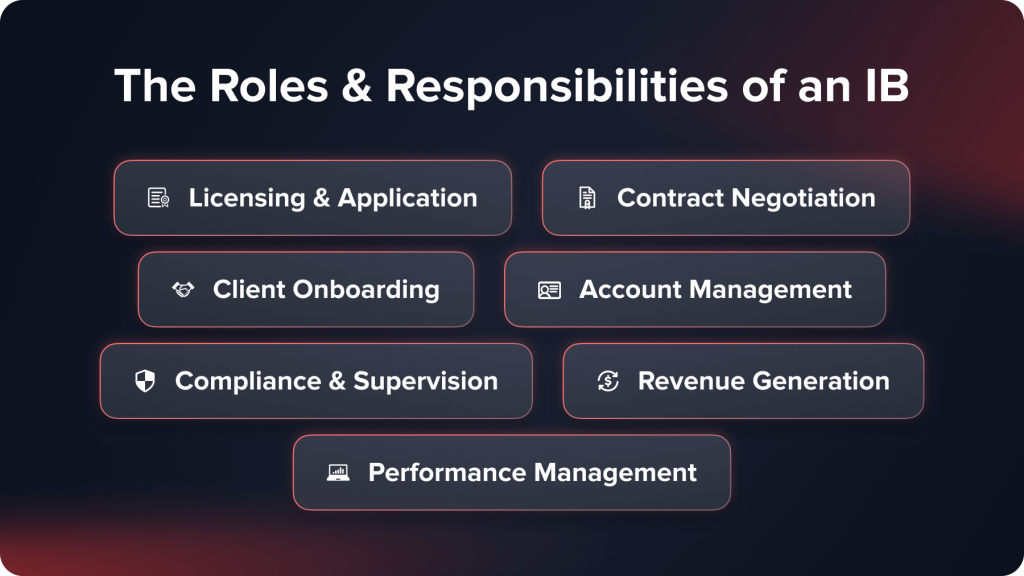
1. การอนุญาตและการสมัคร
การจะเป็น IB ขั้นตอนแรกคือการได้รับใบอนุญาตที่จำเป็นจากหน่วยงานกำกับดูแลทางการเงินในท้องถิ่น ซึ่งเกี่ยวข้องกับกระบวนการสมัครที่ครอบคลุม ซึ่งรวมถึงการตรวจสอบประวัติอย่างละเอียดและการแสดงคุณสมบัติที่จำเป็น คุณสมบัติหลักบางประการที่ประเมิน ได้แก่ ประสบการณ์ในอุตสาหกรรมการเงิน ทรัพยากรทางการเงินที่เพียงพอ และทัศนคติที่มุ่งมั่นในการปฏิบัติตามกฎระเบียบอย่างเคร่งครัด
2. การเจรจาสัญญา
เมื่อได้รับใบอนุญาตแล้ว IB จะสามารถยื่นขอเป็นตัวแทนจากบริษัทนายหน้าซื้อขายหลักทรัพย์ที่จัดตั้งขึ้นแล้วได้ โดยจะต้องผ่านการตรวจสอบเพื่อให้มั่นใจว่ามีความเหมาะสมทางวัฒนธรรมและมีความมุ่งมั่นร่วมกันในการปฏิบัติตามกฎระเบียบ หากได้รับอนุมัติ จะมีการร่างข้อตกลงเบื้องต้นทางกฎหมาย ซึ่งระบุเงื่อนไขสำคัญๆ เช่น
- อาณาเขตการดำเนินงาน
- ขั้นตอนการรับลูกค้าใหม่และการอ้างอิง
- หน้าที่และความรับผิดชอบในการกำกับดูแล
- รูปแบบการแบ่งปันรายได้และการแบ่งค่าคอมมิชชั่น
3. การต้อนรับลูกค้า
IB ทำหน้าที่เป็นผู้ประสานงานหลักในการแนะนำลูกค้าใหม่เข้าสู่แพลตฟอร์มโบรกเกอร์อย่างเหมาะสม พวกเขามีความสำคัญอย่างยิ่ง ดังที่เห็นได้จากชื่อ "การแนะนำ" ในการแนะนำลูกค้าเข้าสู่แพลตฟอร์ม หน้าที่ที่สำคัญนี้เกี่ยวข้องกับ:
- การรวบรวมข้อมูล KYC และการยืนยันตัวตน
- การประเมินความรู้ด้านการลงทุน การยอมรับความเสี่ยง และความสามารถทางการเงินของลูกค้า
- ดำเนินการตามความต้องการโดยละเอียด - การจัดทำโปรไฟล์เพื่อให้แน่ใจว่ามีการจัดหมวดหมู่บัญชีอย่างเหมาะสม
4. การจัดการบัญชี
IB ติดต่อกับลูกค้าอย่างสม่ำเสมอผ่านช่องทางการสนับสนุนที่หลากหลาย พวกเขาต้องแก้ไขข้อกังวลอย่างทันท่วงทีและส่งต่อปัญหาที่ซับซ้อนไปยังโบรกเกอร์เมื่อจำเป็น ความรับผิดชอบอย่างต่อเนื่องประกอบด้วย:
- การประเมินความเหมาะสมสำหรับการซื้อขายหรือกลยุทธ์ที่แนะนำ
- การตรวจสอบบัญชีลูกค้าสำหรับกิจกรรมที่ผิดปกติหรือที่น่าสงสัย
- การทำให้แน่ใจว่าลูกค้าได้รับเอกสารการศึกษาและการวิจัยที่เกี่ยวข้อง
5. การปฏิบัติตามและการกำกับดูแล
IBs จะต้องผ่านการฝึกอบรมด้านการปฏิบัติตามกฎระเบียบอย่างครอบคลุม และมีหน้าที่รับผิดชอบในการปฏิบัติตามข้อกำหนดทั้งหมด บทบาทบางประการในการรับรองการปฏิบัติตามกฎระเบียบ ได้แก่:
- การอนุมัติล่วงหน้าสำหรับวัสดุการตลาดทั้งหมดที่ใช้
- การบำรุงรักษาฐานข้อมูลลูกค้าและดำเนินการตรวจสอบเป็นประจำ
- การรายงานการละเมิดนโยบายหรือกิจกรรมที่น่าสงสัยที่ตรวจพบ
6. การสร้างรายได้
IB มีรายได้ต่อเนื่องเป็นเปอร์เซ็นต์คงที่ (โดยทั่วไปอยู่ที่ 30-50%) ของค่าคอมมิชชั่นและค่าธรรมเนียมจากฐานลูกค้าที่เข้ามา IB ที่ประสบความสำเร็จส่วนใหญ่มักมุ่งหวังที่จะเพิ่มผลกำไรอย่างต่อเนื่องผ่านประสิทธิภาพที่ยอดเยี่ยมและบริการเสริมที่มอบให้แก่ IB ซึ่งหมายความว่าประสบการณ์ ความสามารถ และปัจจัยอื่นๆ อาจมีผลกระทบอย่างมากต่อการกำหนดรายได้
7. การจัดการประสิทธิภาพการทำงาน
IB ขนาดใหญ่และมีประสิทธิภาพสูงจะมีส่วนร่วมกับลูกค้าอย่างแข็งขันผ่านการสัมมนาออนไลน์ การวิจัย และกิจกรรมต่างๆ พวกเขายังทำให้เวิร์กโฟลว์เป็นระบบอัตโนมัติเพื่อเพิ่มประสิทธิภาพสูงสุดผ่านทีมงานเฉพาะและบริการที่ปรับแต่งได้ โดยรวมแล้ว ความสำเร็จของ IB มาจากการสร้างสมดุลระหว่างการเติบโตของรายได้และความรับผิดชอบด้านกฎระเบียบอย่างมืออาชีพและรอบคอบ
บทบาทและความรับผิดชอบของพันธมิตร
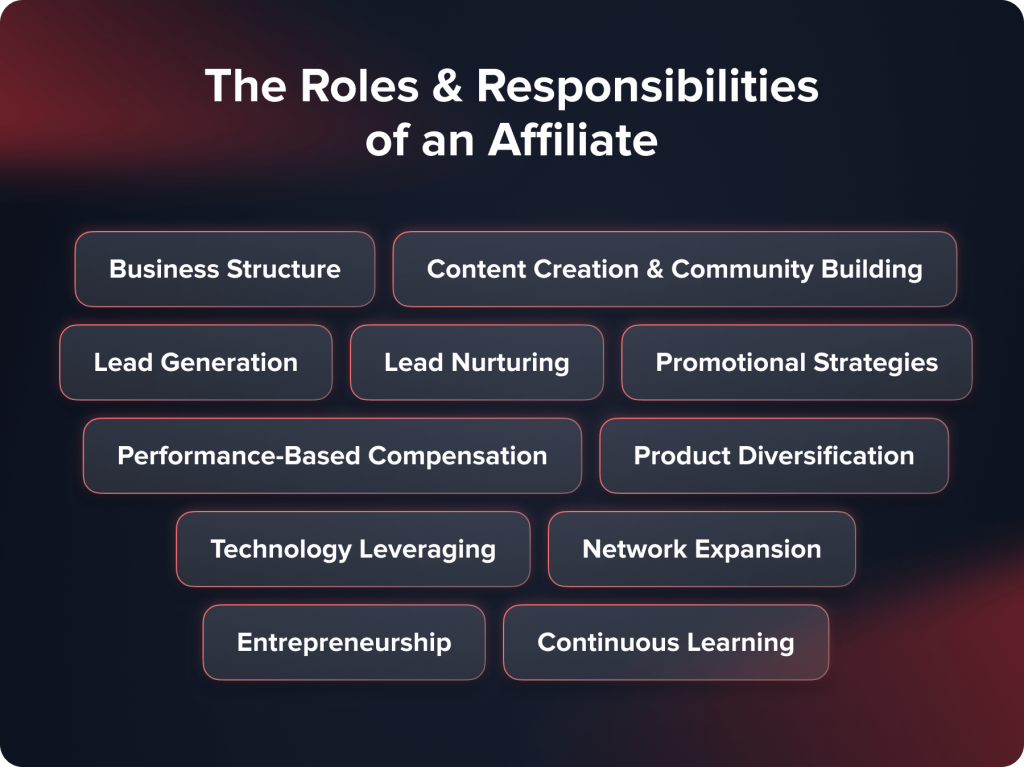
1. โครงสร้างธุรกิจ
ต่างจาก IB พันธมิตรไม่ต้องปฏิบัติตามข้อกำหนดด้านใบอนุญาต จึงมีความยืดหยุ่นอย่างเต็มที่ในโครงสร้างและการดำเนินงานทางธุรกิจ พันธมิตรสามารถเลือกดำเนินงานได้อย่างอิสระทั้งแบบพาร์ทไทม์และเต็มเวลา ซึ่งหมายความว่า ต่างจาก IB พันธมิตรไม่จำเป็นต้องมีคุณสมบัติทางการเงินและทรัพยากรทางการเงินอื่นๆ อย่างชัดเจน
2. การสร้างเนื้อหาและการสร้างชุมชน
พันธมิตรที่มีชื่อเสียงสามารถใช้ประโยชน์จากแพลตฟอร์มที่หลากหลายได้อย่างมีประสิทธิภาพ เพื่อพัฒนาชุมชนผู้ติดตามขนาดใหญ่ ผ่านเนื้อหาที่น่าสนใจและสม่ำเสมอ ซึ่งรวมถึง:
- การสร้างเว็บไซต์ที่มีอำนาจผ่านการวิเคราะห์แนวโน้มอุตสาหกรรม
- การผลิตคอนเทนต์ไลฟ์สไตล์และการศึกษาบนโซเชียลมีเดีย
- อำนวยความสะดวกให้กับฟอรัมและชุมชนสำหรับการอภิปรายของเพื่อน
3. การสร้างโอกาสในการขาย
พันธมิตรใช้กลยุทธ์การตลาดแบบกำหนดเป้าหมายเพื่อสร้างลูกค้าเป้าหมายที่มีคุณสมบัติ เช่น:
- การเพิ่มประสิทธิภาพเครื่องมือค้นหาและแคมเปญจ่ายต่อคลิก
- การปรับแต่งหน้า Landing Page และลิงก์พันธมิตรที่ฝังได้
- การใช้ประโยชน์จากโอกาสในการสร้างเครือข่ายทั้งทางออนไลน์และออฟไลน์
4. การบ่มเพาะลูกค้าเป้าหมาย
พันธมิตรชั้นนำจะช่วยส่งเสริมการเติบโตอย่างรวดเร็วของกลุ่มเป้าหมายผ่านข้อความและแหล่งข้อมูลทางการศึกษา ซึ่งแสดงให้เห็นถึงความรู้เชิงลึกเกี่ยวกับผลิตภัณฑ์ เพื่อนำมาพูดคุยถึงประโยชน์ได้อย่างมีประสิทธิภาพ
5. กลยุทธ์ส่งเสริมการขาย
กลยุทธ์การส่งเสริมการขายได้รับการปรับให้เหมาะสมอย่างต่อเนื่องโดยการทดสอบรูปแบบเนื้อหา แพลตฟอร์ม และระยะเวลาที่แตกต่างกัน ตัวชี้วัดต่างๆ เผยให้เห็นกลยุทธ์ที่มีอัตราการแปลงสูงสุดเพื่อมุ่งเน้นความพยายาม
6. การจ่ายค่าตอบแทนตามผลงาน
รายได้ของพันธมิตรนั้นขึ้นอยู่กับรูปแบบการจ่ายเงินตามผลงานจากความร่วมมือกับผู้ค้า เช่น ต้นทุนต่อการได้มาหรือการแบ่งปันรายได้จากปริมาณการซื้อขาย
7. การกระจายความหลากหลายของผลิตภัณฑ์
พันธมิตรที่ชาญฉลาดสามารถกระจายสินค้าไปยังร้านค้าหลากหลายประเภท พร้อมกับพัฒนาความเชี่ยวชาญเฉพาะด้าน พันธมิตรจะสำรวจการส่งเสริมการขายแบบผสมผสานที่สอดประสานกัน
8. การใช้ประโยชน์จากเทคโนโลยี
พันธมิตรนำเทคโนโลยีใหม่ๆ มาใช้เพื่อเพิ่มการมีส่วนร่วม สร้างกระบวนการอัตโนมัติ และปรับขนาดการดำเนินการผ่านทีมงานเฉพาะทาง
9. การขยายเครือข่าย
พันธมิตรระดับสูงสุดอาจสร้างเครือข่ายพันธมิตรโดยการให้คำปรึกษาและอำนวยความสะดวกในข้อตกลงแบ่งปันผลกำไรกับพันธมิตรระดับย่อยที่ลงทะเบียนไว้
10. การเป็นผู้ประกอบการ
พันธมิตรที่ประสบความสำเร็จสูงสุดใช้ทักษะในการพัฒนาธุรกิจที่เป็นกรรมสิทธิ์นอกเหนือจากการโปรโมตผู้ค้ารายเดียว เช่น ผลิตภัณฑ์ทางการศึกษาที่ปรับแต่งตามความต้องการ
11. การเรียนรู้อย่างต่อเนื่อง
การศึกษาด้วยตนเองอย่างต่อเนื่อง การแสดงให้เห็นถึงความซื่อสัตย์สุจริต และการตรวจสอบข้อเรียกร้องที่ได้รับการยืนยันอย่างอิสระถือเป็นสิ่งจำเป็นต่อการเจริญเติบโตในระยะยาวในอุตสาหกรรมที่ขับเคลื่อนด้วยประสิทธิภาพนี้
โดยสรุป การแยกกลยุทธ์แบบไดนามิกและการดำเนินการที่สมดุลเป็นตัวอย่างของตำแหน่งผู้นำในเครือข่ายที่ยั่งยืนในระยะยาว
5 ขั้นตอนในการเป็นโบรกเกอร์แนะนำ
หากต้องการเป็นนายหน้าแนะนำ คุณควรพบว่าขั้นตอนต่างๆ ที่ระบุไว้ด้านล่างนี้มีประโยชน์
1. ทราบใบรับรองที่จำเป็นที่คุณต้องการ
การที่คุณจะต้องได้รับการรับรองเพื่อเป็นตัวแทนนายหน้าหรือไม่นั้น ขึ้นอยู่กับสถานที่ตั้งเป้าหมายของคุณ ตัวอย่างเช่น ภูมิภาคอย่างแอฟริกาใต้ สหรัฐอเมริกา และออสเตรเลีย กำหนดให้ต้องมีการรับรอง ในขณะที่สหภาพยุโรปไม่จำเป็นต้องมี อย่างไรก็ตาม การรับรองนี้ไม่ได้รับประกันการเป็นพันธมิตรโดยอัตโนมัติในสหภาพยุโรป เนื่องจากอาจมีการพิจารณาปัจจัยอื่นๆ ที่เกี่ยวข้อง ข้อมูลเกี่ยวกับเรื่องนี้สามารถขอได้จากหน่วยงานกำกับดูแลทางการเงินที่เกี่ยวข้อง
2. ค้นคว้าและร่วมมือกับนายหน้าที่เหมาะสม
เมื่อคุณได้รับการรับรองเรียบร้อยแล้ว ให้ค้นคว้าและมั่นใจว่าคุณได้ร่วมงานกับโบรกเกอร์ที่เหมาะสม การวิจัยเชิงลึกเป็นสิ่งจำเป็นเนื่องจากมีโบรกเกอร์อยู่ค่อนข้างมาก ก่อนการค้นคว้า คุณสามารถเตรียมรายการคำถามไว้สำหรับการทำงาน เช่น
- โบรกเกอร์ได้รับการควบคุมหรือไม่?
- คุณภาพการบริการของพวกเขาเป็นอย่างไรบ้าง?
- พวกเขาให้ทรัพยากรทางการตลาดหรือไม่?
- พวกเขาให้เครื่องมือที่เป็นเอกลักษณ์สำหรับทั้ง IB และลูกค้าหรือไม่?
- แล้วการซื้อขายสาธิตล่ะ?
- ลูกค้า/ผู้ใช้พูดถึงพวกเขา (บทวิจารณ์) อย่างไร?
- มีแอพซื้อขายมั้ย?
คุณสามารถเพิ่มคำถามอื่นๆ ที่คุณเห็นว่าเหมาะสมลงในรายการได้ วิธีนี้จะช่วยให้คุณกรองคำถามอื่นๆ ออกไปได้ เหลือเพียงคำถามที่สอดคล้องกับเป้าหมายของคุณ
3. ทำข้อตกลงกับโบรกเกอร์ที่คุณเลือก
ในขั้นตอนนี้ คุณจำเป็นต้องทำความคุ้นเคยกับข้อเสนอต่างๆ เช่น อัตราค่าคอมมิชชั่นของโบรกเกอร์ที่เลือก แต่ก่อนอื่น คุณควรมีกลยุทธ์ในการดึงดูดลูกค้าใหม่ ซึ่งจะช่วยให้คุณกำหนดประเภทลูกค้าที่ต้องการดึงดูด และพิจารณาว่าข้อเสนอของโบรกเกอร์ที่เลือกนั้นเหมาะสมกับคุณหรือไม่ รูปแบบค่าคอมมิชชั่นอาจเป็นแบบ RevShare, CPA หรือแบบผสม ขึ้นอยู่กับความยืดหยุ่นของโบรกเกอร์ที่มีต่อข้อเสนอ คุณอาจพิจารณาโซลูชันที่ปรับแต่งตามความต้องการ
4. ลงทะเบียนลูกค้าใหม่ผ่านลิงก์อ้างอิงของคุณ
หลังจากเซ็นสัญญากับบริษัทแล้ว ก็ถึงเวลาลงมือทำและนำกลยุทธ์การหาลูกค้าของคุณไปใช้ สร้างเว็บไซต์และเผยแพร่เนื้อหาที่เกี่ยวข้องซึ่งอาจดึงดูดลูกค้าเป้าหมายและ/หรือติดต่อพวกเขาผ่านช่องทางที่เหมาะสม ใช้เวลาศึกษาและทำความรู้จักลูกค้าเป้าหมายของคุณ ขณะเดียวกัน คุณยังสามารถเข้าใจปัญหาของพวกเขาและร่วมแบ่งปันแนวทางแก้ปัญหาด้านโบรกเกอร์ของคุณได้ พิจารณาประเภทของเทรดเดอร์ของพวกเขา เช่น เทรดเดอร์แบบ Scalper, Swing Trader หรือ Position Trader แล้วสร้างเนื้อหาเกี่ยวกับสไตล์การเทรดของพวกเขา
5. สร้างการปรากฏตัวออนไลน์
เป้าหมายของคุณคือการแสดงตัวเองเป็น บุคคลที่ติดต่อได้ ในเรื่องที่เกี่ยวข้องกับการเทรดฟอเร็กซ์ออนไลน์ ดังนั้น คุณควรเผยแพร่ชื่อของคุณให้เป็นที่รู้จักบนอินเทอร์เน็ต ไม่ว่าจะเป็นแพลตฟอร์มโซเชียลมีเดีย ฟอรัมเทรดออนไลน์ ฯลฯ แน่นอนว่าการบรรลุเป้าหมายนี้ต้องอาศัยการเผยแพร่เนื้อหาที่มีคุณภาพบนช่องทางเหล่านี้ และการมีส่วนร่วมอย่างสำคัญต่อวงการเทรด การทำให้ชื่อของคุณเป็นที่รู้จักสามารถสร้างผลตอบแทนจากค่าคอมมิชชั่นได้อย่างมาก
ข้อควรพิจารณาด้านการปฏิบัติตามข้อกำหนดสำหรับ IB และบริษัทในเครือ
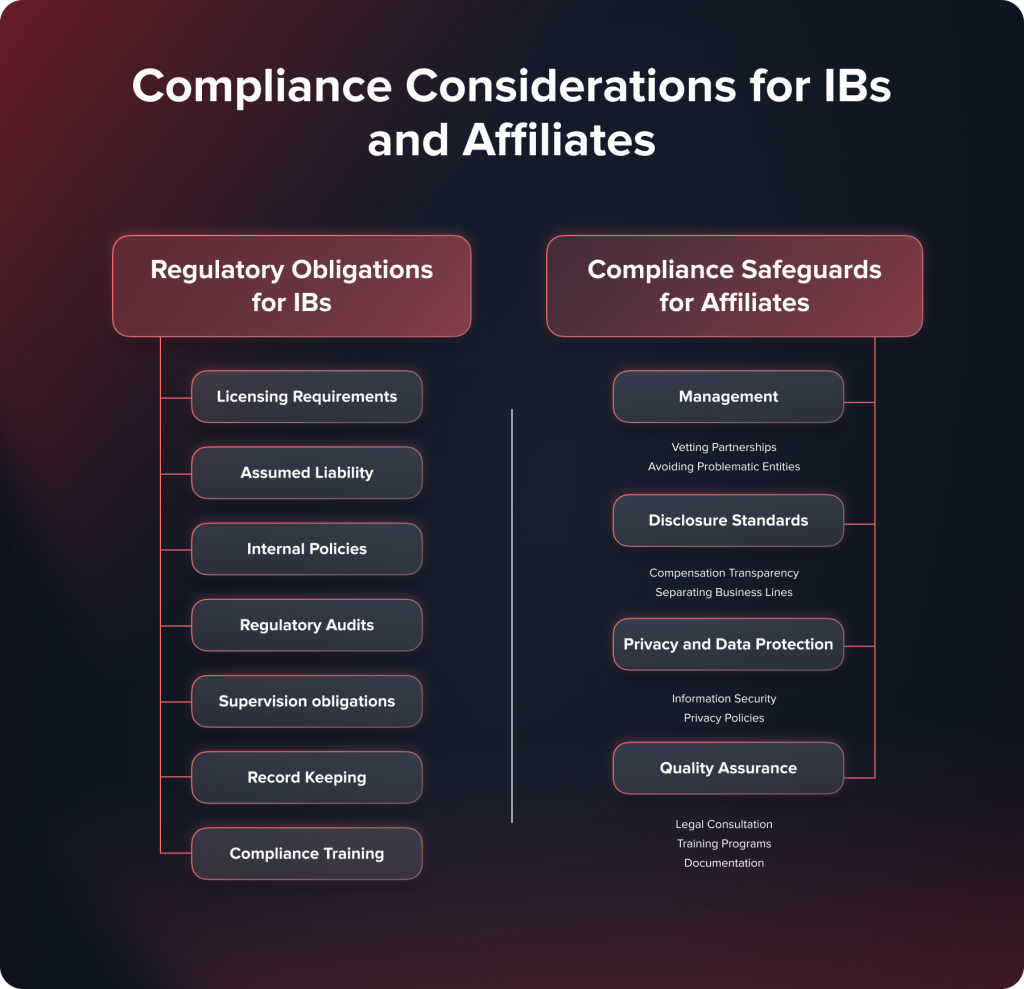
ก. ภาระผูกพันด้านกฎระเบียบสำหรับ IB
- ข้อกำหนดในการออกใบอนุญาต:IB จะต้องได้รับการลงทะเบียนที่จำเป็นจากหน่วยงานทางการเงิน ซึ่งเกี่ยวข้องกับการตรวจสอบประวัติอย่างเข้มงวด
- ความรับผิดชอบที่รับมา:ในฐานะตัวแทนที่ได้รับอนุญาต IB จะต้องรับผิดชอบทางกฎหมายและทางการเงินสำหรับกิจกรรมและความสัมพันธ์ของลูกค้าทั้งหมดภายใต้การกำกับดูแลของตน
- นโยบายภายใน:ต้องมีการดูแลรักษาคู่มือการปฏิบัติตามข้อกำหนดภายในที่เข้มงวดเพื่อจัดการกับปัญหาต่างๆ เช่น ความขัดแย้งทางผลประโยชน์ การโฆษณา การจัดการการร้องเรียน แนวทางปฏิบัติความเป็นส่วนตัว และขั้นตอนต่อต้านการฟอกเงิน
- การตรวจสอบตามกฎระเบียบ:ระบบและการควบคุมจะต้องได้รับการตรวจสอบเป็นระยะโดยหน่วยงานกำกับดูแลเพื่อให้แน่ใจว่ามีการนำไปปฏิบัติอย่างเหมาะสมและป้องกันการประพฤติมิชอบ
- ภาระหน้าที่ในการกำกับดูแล:การตรวจสอบความเหมาะสมของคำแนะนำการซื้อขาย การอนุมัติสื่อการตลาด การกำกับดูแลแนวทางปฏิบัติด้านเอกสารของลูกค้า และการจัดการเครือข่ายโบรกเกอร์ระดับจูเนียร์
- การบันทึกข้อมูล:ฐานข้อมูลส่วนกลางที่เก็บข้อมูลลูกค้าที่ละเอียดอ่อนจะถูกควบคุมและต้องมีการรับรองความปลอดภัยของข้อมูลที่ให้มา
- การฝึกอบรมการปฏิบัติตามข้อกำหนด:เจ้าหน้าที่จะต้องเข้ารับการฝึกอบรมอย่างครอบคลุมเพื่อให้มั่นใจว่ามีการเข้าใจและปฏิบัติตามกฎระเบียบและนโยบายภายใน
B. มาตรการป้องกันการปฏิบัติตามข้อกำหนดสำหรับบริษัทในเครือ
1. การจัดการ
- การตรวจสอบความร่วมมือ: ตรวจสอบคุณสมบัติ ใบอนุญาต และบันทึกการปฏิบัติตามกฎระเบียบของโบรกเกอร์ที่ได้รับการส่งเสริมอย่างอิสระ แม้ว่าบริษัทในเครือจะไม่มีการกำกับดูแลโดยตรง แต่การสร้างความน่าเชื่อถือต้องอาศัยการแสดงความซื่อสัตย์สุจริต
- การหลีกเลี่ยงสิ่งที่ก่อให้เกิดปัญหา: การงดรับรองโบรกเกอร์ที่มีประวัติปัญหาที่น่ากังวล เช่น การลงโทษหรือการร้องเรียนของลูกค้า
2. มาตรฐานการเปิดเผยข้อมูล
- ความโปร่งใสในการชดเชย:ระบุการชำระเงินที่ได้รับจากพันธมิตรที่อ้างอิงอย่างชัดเจนในการสื่อสารสาธารณะทั้งหมดเพื่อสร้างความน่าเชื่อถือ
- การแยกสายธุรกิจ:การรักษาการแบ่งส่วนที่เหมาะสมระหว่างธุรกิจในเครือและธุรกิจอิสระหรือคำแนะนำ
3. ความเป็นส่วนตัวและการคุ้มครองข้อมูล
- ความปลอดภัยของข้อมูล:ส่งเสริมความปลอดภัยทางเทคโนโลยีและทางกายภาพที่แข็งแกร่งของรายละเอียดลูกค้าที่รวบรวมตามความยินยอมและสิทธิ์ที่กำหนดไว้
- นโยบายความเป็นส่วนตัว:การระบุวัตถุประสงค์การใช้งาน ระยะเวลาการจัดเก็บ และมาตรการป้องกันที่ใช้กับข้อมูลส่วนบุคคลเพื่อความโปร่งใส
4. การประกันคุณภาพ
- ให้คำปรึกษาทางกฎหมาย:การติดตามการเปลี่ยนแปลงกฎระเบียบผ่านคำแนะนำอย่างต่อเนื่องเพื่อให้แน่ใจว่ามีความพร้อม
- โปรแกรมการฝึกอบรม:การบริหารจัดการริเริ่มการเรียนรู้ของพนักงานเพื่อบูรณาการความก้าวหน้าเข้ากับการดำเนินงานประจำวัน
- เอกสารประกอบ:การรักษาบันทึกที่ครอบคลุมของกรอบการปฏิบัติตาม การตัดสินใจ และปัญหาต่างๆ สำหรับการป้องกันและการระบุการปรับปรุงในอนาคต
การปฏิบัติตามโปรแกรมการปฏิบัติตามกฎระเบียบที่มีโครงสร้างอย่างรอบคอบจะช่วยนำทางกฎระเบียบที่ซับซ้อน ควบคู่ไปกับการสร้างชื่อเสียงในระยะยาวในด้านความน่าเชื่อถือให้กับทั้ง IB และบริษัทในเครือ การติดตามพัฒนาการของอุตสาหกรรมช่วยให้เกิดการพัฒนาอย่างต่อเนื่อง
กลยุทธ์การสร้างรายได้สำหรับ IB และพันธมิตร
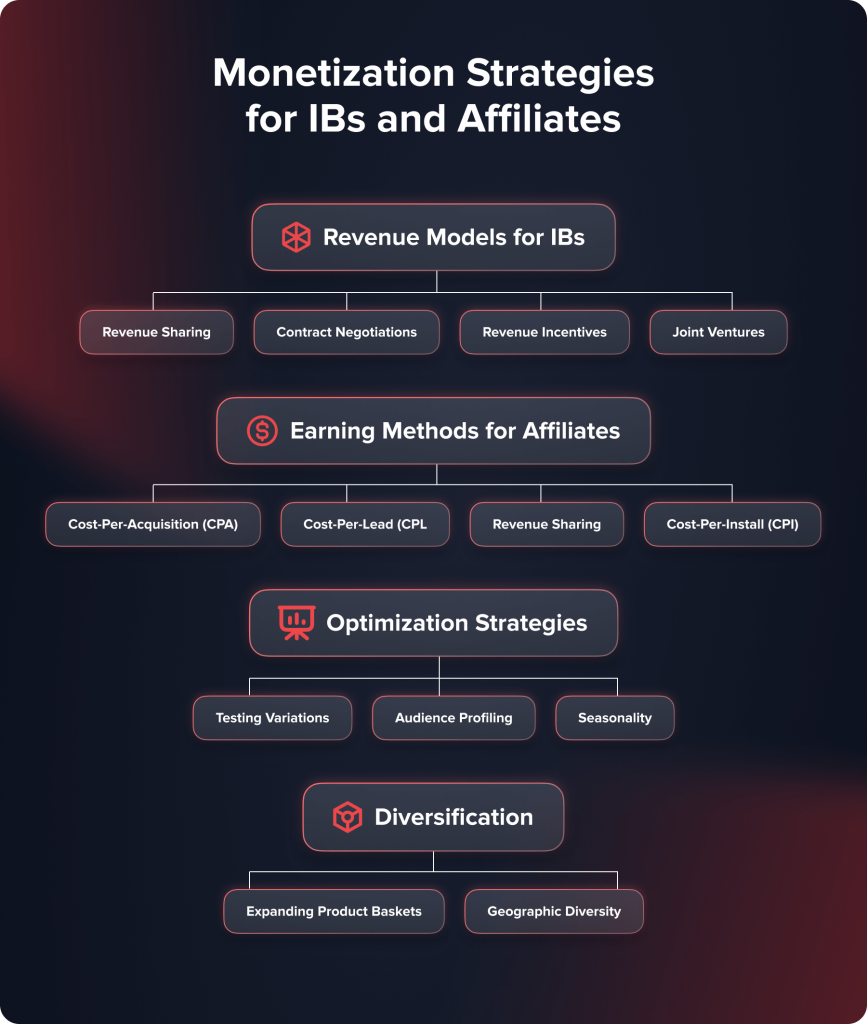
1. โมเดลรายได้สำหรับ IB
- การแบ่งปันรายได้:IB จะได้รับค่าคอมมิชชั่นอย่างต่อเนื่องเป็นเปอร์เซ็นต์ของปริมาณการซื้อขายและค่าธรรมเนียมที่สร้างขึ้นโดยฐานลูกค้าที่แนะนำ ซึ่งโดยทั่วไปจะอยู่ระหว่าง 30-50%
- การเจรจาสัญญา:IB ขนาดใหญ่จะมีอำนาจในการต่อรองที่มากขึ้นในการปรับเปอร์เซ็นต์ขึ้นตามเกณฑ์ประสิทธิภาพหรือใช้รูปแบบการแบ่งปันความเสี่ยง
- แรงจูงใจด้านรายได้:โบรกเกอร์บางรายเสนออัลกอริทึมการจ่ายเงินที่ปรับเปลี่ยนได้ โดยที่การแบ่งคอมมิชชันสามารถเพิ่มขึ้นได้เรื่อยๆ เมื่อผ่านเป้าหมายที่กำหนดไว้ล่วงหน้า
- การร่วมทุน:บางครั้ง IB หลายรายจะรวมทรัพยากรเข้าด้วยกันเพื่อร่วมมือกันในด้านเทคโนโลยี การเข้าถึงการขาย การวิจัย ฯลฯ เพื่อเพิ่มอำนาจต่อรองในการเจรจา
2. วิธีการสร้างรายได้สำหรับพันธมิตร
- ต้นทุนต่อการได้มา (CPA): การจ่ายเงินครั้งเดียวจำนวน 20-150 เหรียญสหรัฐหรือมากกว่าต่อผู้ใช้ที่แนะนำซึ่งทำการลงทะเบียนบัญชีโบรกเกอร์ให้เสร็จสิ้น
- ต้นทุนต่อรายชื่อผู้สนใจซื้อ (CPL): ชดเชย 2-10 เหรียญสำหรับการรวบรวมข้อมูลการติดต่อพื้นฐานที่ส่งต่อไปยังผู้ค้า
- การแบ่งปันรายได้: รับส่วนแบ่ง 2-5% จากการขาดทุน/กำไรจากการซื้อขายจริงหรือเงินฝากจากลูกค้าที่ยังคงใช้งานหลังจาก 180 วัน
- ต้นทุนต่อการติดตั้ง (CPI): ชำระค่าธรรมเนียมคงที่ 1-5 ดอลลาร์ต่อการติดตั้งแอปหรือการรวมวิดเจ็ตบนเว็บไซต์ที่ขับเคลื่อนการติดตั้ง
3. กลยุทธ์การเพิ่มประสิทธิภาพ
- การทดสอบรูปแบบต่างๆ:การทดลองกับรูปแบบการส่งเสริมการขาย แพลตฟอร์ม แฮชแท็ก ฯลฯ เพื่อระบุแคมเปญที่มีอัตราการแปลงสูงสุด
- การสร้างโปรไฟล์ผู้ชมการปรับแต่งเนื้อหา ข้อเสนอ และข้อความให้ตรงกับความต้องการของผู้ชำระเงินจะทำให้ได้รับอัตราการตอบสนองที่ดีขึ้น
- ฤดูกาล:โดยใช้ประโยชน์จากเหตุการณ์ปัจจุบัน รายงานทางการเงิน และช่วงวันหยุด ซึ่งเป็นช่วงที่ผู้ฟังสนใจมากที่สุด
4. การกระจายความเสี่ยง
- การขยายตะกร้าสินค้า:ลดการพึ่งพาที่มากเกินไปด้วยการส่งเสริมการขายข้ามประเภทสินทรัพย์ เช่น FX ดัชนี และโบรกเกอร์สกุลเงินดิจิทัล
- ความหลากหลายทางภูมิศาสตร์:การสร้างกลยุทธ์ที่น่าสนใจในระดับท้องถิ่นโดยคำนึงถึงความแตกต่างทางวัฒนธรรมและกฎหมายจะช่วยให้ขยายขอบเขตไปในระดับโลกได้
การทำให้เวิร์กโฟลว์อัตโนมัติผ่านเครือข่ายพันธมิตรช่วยอำนวยความสะดวกในการจัดการพอร์ตโฟลิโอของผู้ค้าหลายรายและการติดตามผลการดำเนินงาน การวิเคราะห์ที่ครอบคลุมช่วยระบุกลยุทธ์การสร้างรายได้ที่ดีที่สุด
การเพิ่มประสิทธิภาพและการกระจายความเสี่ยงแบบไดนามิกช่วยสนับสนุนการสร้างรายได้ที่ทำกำไรให้กับทั้ง IB และพันธมิตรในสภาพแวดล้อมที่เน้นประสิทธิภาพการแข่งขัน
โปรไฟล์ทั่วไปสำหรับ IB และพันธมิตร
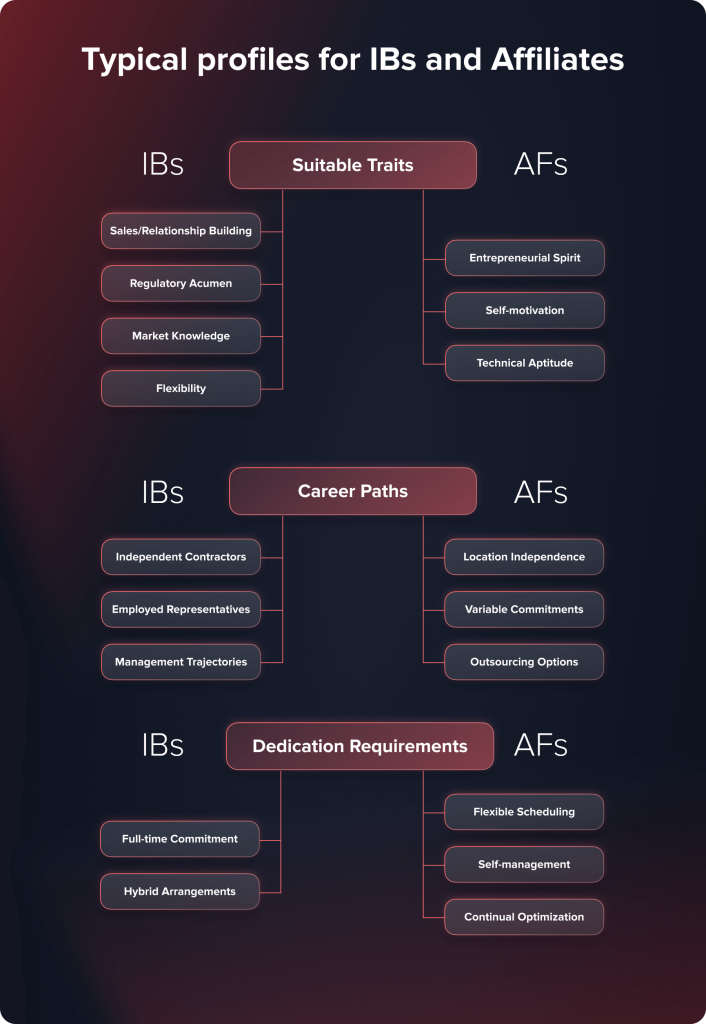
1. ลักษณะนิสัยที่เหมาะสมสำหรับ IB
- การขาย/การสร้างความสัมพันธ์:บทบาทของตัวแทนต้องการความสามารถในการติดต่อกับลูกค้าอย่างกระตือรือร้นผ่านการสร้างเครือข่าย การพูดในที่สาธารณะ และทักษะในการสร้างความสัมพันธ์
- ความเฉียบแหลมด้านกฎระเบียบการรักษาการปฏิบัติตามนั้นต้องอาศัยบุคลากรที่ขยันขันแข็งและมีประสบการณ์ด้านกฎหมายและขั้นตอนที่เกี่ยวข้อง
- ความรู้ด้านตลาด:ผู้เชี่ยวชาญในระดับภูมิภาคที่ใช้ประโยชน์จากความเข้าใจอันละเอียดอ่อนของกลุ่มลูกค้าในท้องถิ่นทำผลงานได้อย่างโดดเด่น
- ความยืดหยุ่น:เทคโนโลยีมือถือช่วยให้การทำงานแบบระยะไกลและการเดินทางเป็นแบบผสมผสาน ซึ่งช่วยสร้างสมดุลระหว่างความรับผิดชอบและภาระผูกพันส่วนตัวได้อย่างมีประสิทธิภาพ
2. เส้นทางอาชีพ
- ผู้รับเหมาอิสระ:IB ที่เป็นอาชีพอิสระจะสร้างช่องทางการอ้างอิงใหม่ๆ และจัดการพอร์ตโฟลิโออย่างอิสระ
- ผู้แทนที่ได้รับการจ้างงาน:นายหน้าซื้อขายหลักทรัพย์รายใหญ่จะจ้างทีมงานภายในเต็มรูปแบบเพื่อดูแลพื้นที่ที่กำหนดหรือบทบาทเฉพาะทาง
- เส้นทางการบริหารจัดการ: ในที่สุดผู้ผลิตชั้นนำอาจดูแลนายหน้ารุ่นน้องเพิ่มเติมหรือเปิดสาขาอิสระ
3. ข้อกำหนดการอุทิศตน
- ความมุ่งมั่นเต็มเวลา:การเป็นตัวแทนของนายหน้าทั้งหมดต้องอาศัยความมุ่งมั่นอย่างเข้มข้นต่อความรับผิดชอบในแต่ละวันและการพัฒนาธุรกิจ
- การจัดเตรียมแบบไฮบริด:บางแห่งอนุญาตให้ลดตารางเวลาการทำงานโดยมีการกำกับดูแลแบบเสมือนในการอ้างอิง การฝึกอบรม และการวิจัยสำหรับทีม
4. คุณสมบัติที่เหมาะสมสำหรับผู้ร่วมงาน
- จิตวิญญาณผู้ประกอบการ:ความเจริญรุ่งเรืองต้องอาศัยความพากเพียร ความคิดสร้างสรรค์ และความเป็นอิสระในสภาพแวดล้อมที่เน้นประสิทธิภาพการทำงาน
- แรงจูงใจในตนเองความก้าวหน้าที่ยั่งยืนเกิดจากวินัยในตนเองและความมุ่งมั่นมากกว่าการกำกับดูแล
- ความสามารถทางเทคนิค: ทักษะการสร้างเนื้อหา การเขียนโปรแกรม และการตลาดดิจิทัล จะช่วยเพิ่มประสิทธิภาพการมีส่วนร่วมและผลลัพธ์
5. ความยืดหยุ่นในอาชีพ
- อิสระจากที่ตั้ง: ดำเนินงานในระดับสากลโดยใช้ประโยชน์จากแพลตฟอร์มดิจิทัลจากสถานที่ใดก็ได้
- ความมุ่งมั่นของตัวแปร:สร้างสมดุลความร่วมมือกับกิจการอื่นตามความพร้อมและเป้าหมาย
- ตัวเลือกการเอาท์ซอร์ส: ขยายขอบเขตออกไปจากการเป็นผู้ประกอบการเดี่ยวด้วยการจัดตั้งผู้ช่วยเสมือนหรือทีมเนื้อหา
6. ข้อกำหนดการอุทิศตน
- การกำหนดตารางเวลาที่ยืดหยุ่น: พันธมิตรสามารถเลือกระดับการมีส่วนร่วมได้ตั้งแต่โครงการเสริมแบบพาร์ทไทม์ไปจนถึงการดำเนินงานแบบเต็มเวลา
- การจัดการตนเอง:ความสำเร็จขึ้นอยู่กับแรงจูงใจจากตนเองโดยไม่ต้องมีการดูแลอย่างเป็นระบบ
- การเพิ่มประสิทธิภาพอย่างต่อเนื่อง:พันธมิตรที่ประสบความสำเร็จจะคอยอัปเดตเกี่ยวกับการเปลี่ยนแปลงของอุตสาหกรรมผ่านการฝึกอบรมทางออนไลน์และแบบตัวต่อตัว
ความเหมาะสมขึ้นอยู่กับการจับคู่จุดแข็ง ความปรารถนา และลำดับความสำคัญกับความรับผิดชอบในแต่ละเส้นทางเพื่อความพึงพอใจในอาชีพในระยะยาวและความสำเร็จภายในโดเมนการพัฒนาธุรกิจ
บทสรุป
แม้ว่าทั้งสองจะมีบทบาทในการส่งเสริมการขายที่สำคัญ แต่โบรกเกอร์แนะนำและบริษัทในเครือมีความแตกต่างกันอย่างมากในด้านการจำแนกประเภทตามกฎระเบียบ โครงสร้างความสัมพันธ์ตามสัญญา ความรับผิดชอบในการดำเนินงาน และรูปแบบการสร้างรายได้
อาชีพ IB มอบความมั่นคงมากกว่าสำหรับผู้ที่ต้องการผสมผสานจิตวิญญาณผู้ประกอบการเข้ากับการสนับสนุนทางการเงินที่มีการควบคุม อย่างไรก็ตาม กระบวนการทำงานจำเป็นต้องมีความมุ่งมั่นในระดับภูมิภาคและอุปสรรคด้านใบอนุญาต/การปฏิบัติตามอย่างต่อเนื่อง
งานพันธมิตรเหมาะกับผู้ที่มุ่งมั่นทำงานอิสระที่ต้องการความยืดหยุ่นอย่างเต็มที่ แต่ยังคงได้รับแรงจูงใจที่เน้นผลงาน ช่วยให้สามารถพัฒนาทักษะและความเชี่ยวชาญออนไลน์ที่มีอยู่ให้ได้สูงสุด การเป็นผู้ประกอบการและความสามารถในการปรับตัวให้เข้ากับการเปลี่ยนแปลงทางพลวัตมีความสำคัญมากกว่าพื้นฐานทางการเงินอย่างเป็นทางการ
บทบาททั้งสองยังคงมีความสำคัญอย่างยิ่งต่อการขยายฐานลูกค้า โดยเฉพาะอย่างยิ่งเมื่อการเปลี่ยนแปลงทางดิจิทัลกำลังนำไปสู่ขอบเขตใหม่ๆ เทคโนโลยีช่วยเสริมศักยภาพของมนุษย์ แต่ข้อมูลรับรองขั้นสูงและความรู้เฉพาะทางยังคงมีความสำคัญ
ไม่ว่าจะดำเนินการในฐานะนายหน้าที่ได้รับใบอนุญาตหรือตัวกลางพันธมิตรอิสระนั้น ขึ้นอยู่กับจุดแข็งของแต่ละบุคคล การยอมรับความเสี่ยง และเป้าหมายด้านไลฟ์สไตล์ ด้วยแนวทางปฏิบัติที่มุ่งมั่นในทุกเส้นทาง นวัตกรรมที่ต่อเนื่องจะช่วยกำหนดเส้นทางอาชีพที่ประสบความสำเร็จในด้านการพัฒนาธุรกิจ
อัปเดต:
18 ธันวาคม 2567



